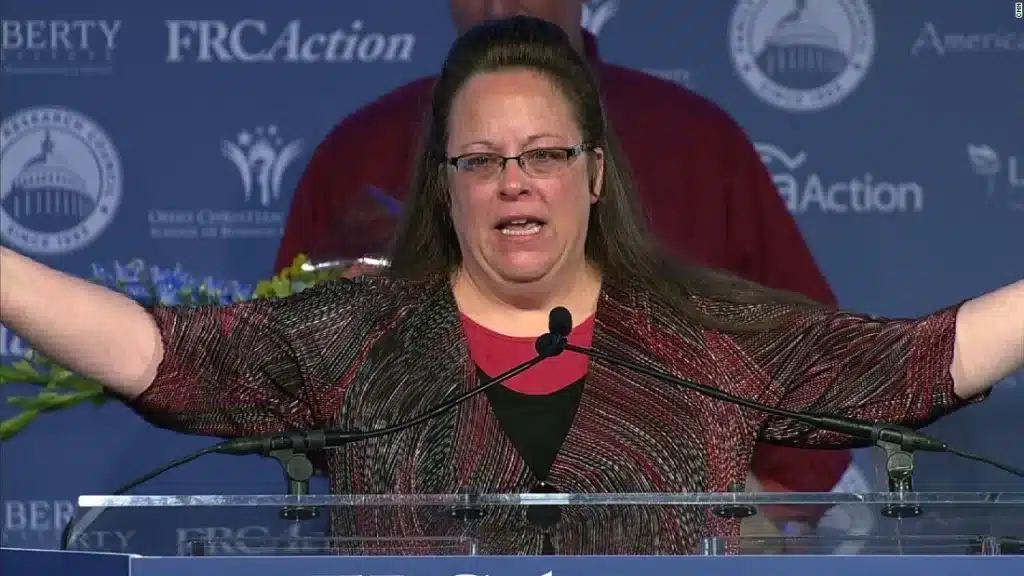The Return of Kim Davis
Kim Davis, a name that once dominated headlines in 2015, has found herself back in the news recently. The former County Clerk from Kentucky, infamous for her refusal to sign same-sex marriage certificates, has lost a significant legal battle that has reignited the public’s interest. Let’s delve into the details of this story and its implications.
The 2015 Controversy
In 2015, following the landmark Obergefell ruling legalizing same-sex marriage nationwide, Kim Davis made headlines when she steadfastly refused to sign marriage certificates for same-sex couples. As a government employee, her personal religious beliefs clashed with her professional duties, setting off a lengthy legal battle.
A Costly Stand
The consequences of Kim Davis’s actions were not just legal but also financial. The state of Kentucky was forced to pay out a substantial sum, approximately $225,000, in legal fees as a result of her actions. This was taxpayer money, and it raised questions about the responsibility of the state in allowing an employee to obstruct a fundamental constitutional right.
A Recent Verdict
Fast forward to the present day, and the Davids, a same-sex couple whose marriage certificate Kim Davis had refused to sign, took legal action against her personally. In a recent verdict, a jury ruled in favor of the Davids, ordering Kim Davis to pay them $100,000. This verdict is significant because it holds her accountable on a personal level.
The Qualified Immunity Argument
Kim Davis’s lawyers had argued that she should be immune from such lawsuits, citing qualified immunity. However, this defense was ultimately unsuccessful. The National Conference of State Legislatures makes it clear that qualified immunity does not apply when a government official violates a clearly established constitutional right, which same-sex marriage is.
Symbolic Justice
While $100,000 is a substantial sum, it is more symbolic than life-changing. It serves as a recognition of the harm caused but may not fully erase the pain endured by the couple. Their lawyer stated that they sought damages for the mental anguish they suffered, and they also plan to request attorney’s fees.
Mixed Outcomes
Interestingly, another same-sex couple who sued Kim Davis for refusing to sign their marriage certificate received a different outcome. A separate jury ruled that this couple would receive no compensation. The reasons behind these varying decisions remain unclear, and this discrepancy raises questions about the consistency of legal outcomes.
Legal Battle Continues
Kim Davis’s lawyers at Liberty Council have expressed their intention to appeal the recent verdict. Their goal is not only to defend Kim Davis but also to challenge the Obergefell ruling itself, seeking to return the issue of same-sex marriage to state-level decisions.
The Hypocrisy of Kim Davis’s Personal Life
One cannot ignore the irony in Kim Davis’s personal life. She refused to sign same-sex marriage certificates, citing her commitment to the sanctity of marriage. However, her own marital history is quite complex, involving multiple marriages, divorces, and remarriages. This stark contrast between her actions and personal life has not gone unnoticed.
Fundraising for Kim Davis
Kim Davis’s legal battles have not only been fought in the courtroom but also in the court of public opinion. Organizations like Liberty Council have been fundraising on her behalf, portraying her as the victim in all of this. They argue that she merely sought religious accommodations, ignoring the broader implications of her actions.
The Bigger Picture
Kim Davis is not the only individual who has claimed religious persecution for refusing to comply with anti-discrimination laws. Others like Joe Kennedy, Barronelle Stutzman, and Lori Smith have used their faith as a shield to justify discriminatory actions. Despite their claims of victimhood, they have faced minimal consequences.
In Conclusion
The recent verdict against Kim Davis represents a significant moment of accountability, even if it comes several years after the initial controversy. While this legal battle may not entirely heal the wounds inflicted, it serves as a reminder that individuals, regardless of their religious beliefs, must adhere to the principles of equality and justice in a democratic society. Kim Davis may have found herself back in the spotlight, but her story highlights the ongoing struggle for LGBTQ+ rights and religious freedom in the United States.

